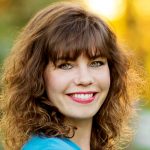In the beautiful valley just outside the small rural community of Elk, Washington, sits Darilane Farms, a special place to third-generation dairy farmer Ashley Hanson. Standing atop a small hill, Hanson looks across the straight stretch in front of her. While the sun slowly sets to the left, fields and mountains stretch as far as the eye can see. “My farm is right in the middle of all this,” she said, smiling. “This is my favorite sight in the entire world.”
Now a junior at Oklahoma State University, Hanson spends most of her days in the classroom, but her heart is still on the farm. She has a sense of pride for the legacy her grandfather has built and a determination to preserve the farm for future generations.
Hanson is not the average 20-year-old in many ways. Channeling her talents and passions into something more, she has turned from a young girl playing princess in the barn into an ambassador for the dairy industry — her skills as a communicator help change the public perception of farming. Hanson has a lot to share with those not fortunate enough to live on the farm and takes every opportunity to teach.
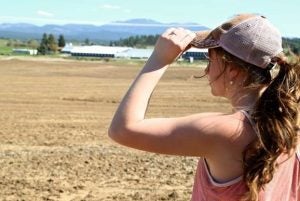
Hanson’s inspiration to teach others about farming stems from the fact that people are now further removed than ever from the farm. The public’s apparent disconnect and lack of understanding of where food comes from fuels Hanson’s passion.
“Think of it this way, [a computer company’s technology] isn’t going to get worse, it’s only going to continue to get better. They’re going to have to treat their employees better to make that better product,” she explained. “And it’s the same here on the farm. We have to treat our employees, our cows, even better to make a better product. And that’s not the reason we do it. We do it because we care for our animals.”
She says that as the face of agriculture has changed in the past few decades some are struggling to grasp the fullness of advancements in animal care and land stewardship. Her mission is to convey those innovations more fully to the public.
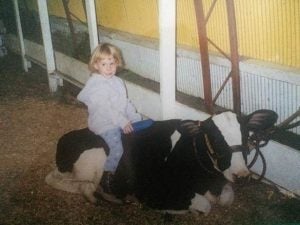
To say she knows the ins and outs of farming is an understatement. Along with her older sister and two younger brothers, she has spent hours of her childhood in the barns caring for her family’s 600-head herd of Holsteins.
“We spent every waking moment on the farm,” she said. “That’s what made my siblings and me best friends.”
She describes dairy farmers as humble, and dairy farming as a practice that keeps one grounded. With the foundation of faith, love for family, and a love for farming, Hanson has a presence that many take a lifetime to achieve and a perspective that is remarkable.
While Hanson can do just about anything on the farm, from bottle feeding calves to making hay, she explained that she realized a hard lesson while growing up: She may never make the best farmer.
“I can do many different things on the farm, but I never had just one role,” she said. “And it took me a while to accept that – that I’m not going to make the best farmer. But I realized that I could be a very good ambassador for my farm; for the dairy farmers of Washington.”
This is when Hanson found an avenue to pursue off the farm. But, don’t worry, she’ll be back.
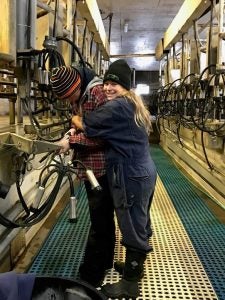
Being a Dairy Ambassador for the Inland Northwest portion of the state gave her the opportunity to use the skills she already had and to fulfill her goals of teaching others about agriculture. She has become a prominent voice for dairy.
“I loved every minute of representing the dairy farmers of Washington, and representing my family and my farm and what we’ve done for so many decades now.”
Right now her goal is getting an education, but her eyes are set on the ultimate prize that will take her home, the farm.
“I’ve been given the gift of communication. I’m natural when it comes to educating people about what we do on the farm and why we do it,” she said. “And I am very passionate about educating people and communicating to the public what we are rooted in, why we do it, how much we care about our animals, our products, and our consumers.”
Through the Ambassador program she met contacts at various hunger relief program food drives and events that eventually led to an internship with Second Harvest in Spokane. Last year, the charitable food bank and distribution center gave more than 30 thousand gallons of milk to meal centers and food banks in Eastern Washington and North Idaho.
She takes every opportunity to teach her friends about farming and thinks of her classes as a networking opportunity. Hanson says she has learned so much from those she has met at OSU and is excited to take her studies of animal science back to the farm.
She enjoys the college scene, learning and meeting new people with varying backgrounds. But she remains steadfast in her future.
“Being at college, I’ve really had to take a look at where my roots are and where they run deep — and that is right at the heart of the farm. My farm, my family is what makes me who I am,” she said. “You can’t get away from your roots, they are a part of who you are, and I have a feeling that I am going to go right back to them, and I am so excited to do that.”
The future professional communicator, and advocate for agriculture says one of her goals is to become a children’s book author, with a focus of writing about agriculture. “It’s a childhood dream of mine,” she said.
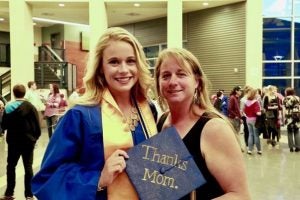
While Hanson was inspired by many hard-working women in her life, it was her mother’s influence that taught her to chase her dreams.
“She’s that farmer, mom of four, and active community member,” Hanson said. “She’s one of the women challenging the male-stereotype farmer. On our farm, it’s not about gender roles. It’s just about who can work hard and get the job done. She does that every single day.”
For now Hanson is finishing her career as a student and enjoying every moment, but Darilane is always on her mind.
“If I get homesick this is what I’m thinking of; that view,” she said. She looks to the west as a small sliver of the sun casts its last light on the valley before sinking below the horizon. “And I know that in 30 seconds I’m going to be on the farm, and in a minute I’ll be at home. It’s always going to be there, I know that deep down, that farm, is always going to be there.”
